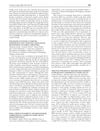Search
for
Sort by
Research
750-780 / 1000+ results
research The Role of Box A of HMGB1 in Enhancing Stem Cell Properties of Human Mesenchymal Cells: A Novel Approach for the Pursuit of Anti-Aging Therapy
Box A of HMGB1 can improve stem cell function, aiding anti-aging therapy.

research Stress-Induced Premature Senescence of Dermal Papilla Cells Compromises Hair Follicle Epithelial-Mesenchymal Interaction
Stress can cause early aging in certain skin cells, leading to problems with hair growth.

research Wnt Signaling and Aging-Related Heart Disorders
Wnt signaling may be linked to heart diseases in aging and could be a target for future treatments.

research Advantages Of Functional Foods In Supporting And Maintaining Hair And Skin Health
Functional foods can improve hair and skin health.

research Molecular Regulation of Melanocyte Senescence
The article concludes that while we understand a lot about how melanocytes age and how this can prevent cancer, there are still unanswered questions about certain pathways and genes involved.
research Keratinocyte Stem Cells: Role in Aging
Aging reduces skin stem cell function, leading to changes like hair loss and slower wound healing.
research Dermatologic Manifestations of Mitochondrial Dysfunction: A Review of the Literature
Mitochondrial dysfunction is linked to various skin conditions and could be a target for treatments.

research Cellular Senescence in Tissue Repair: Every Cloud Has a Silver Lining
Cell aging can be both good and bad for tissue repair.

research Antioxidants in Dermatology
Antioxidants can benefit skin health but should be used carefully to avoid negative effects.

research WNT Signaling in Disease
The WNT signaling pathway is important in many diseases and targeting it could offer new treatments.

research Phloroglucinol Enhances Anagen Signaling and Alleviates H2O2-Induced Oxidative Stress in Human Dermal Papilla Cells
Phloroglucinol may help improve hair loss by promoting hair growth and reducing oxidative stress.
research Hair Follicle Stem Cell Fate Is Dependent on Chromatin Remodeling Capacity Following Low-Dose Radiation
Low-dose radiation affects hair stem cell function and survival by changing their genetic material's structure.
research Transglutaminase 3: The Involvement in Epithelial Differentiation and Cancer
TGM3 is important for skin and hair structure and may help diagnose cancer.

research Hair Cortisol Feasibility and Demographic Correlates in a Sample of Older Adults from Puerto Rico
Older adults in Puerto Rico often couldn't be tested for hair cortisol due to refusal or lack of hair, with race and hair products affecting results.
research Clinical and Metabolic Implications of Obesity in Prostate Cancer: Is Testosterone a Missing Link?
Higher BMI and lower testosterone are linked to more aggressive prostate cancer.

research Optimization of LC Method for the Determination of Testosterone and Epitestosterone in Urine Samples for Biomedical and Anti-Doping Research
Researchers developed a reliable method to measure testosterone and epitestosterone in urine for medical and anti-doping use.

research An Integrative View of Mammalian Seasonal Neuroendocrinology
The article concludes that better understanding gene regulation related to seasonal changes can offer insights into the mechanisms of seasonal timing in mammals.

research Effects of 5-Alpha Reductase Inhibitors on Erectile Function, Sexual Desire, and Ejaculation
5-alpha reductase inhibitors can cause sexual side effects like erectile dysfunction and reduced sexual desire, sometimes lasting after stopping the drug.

research Melatonin Promotes Secondary Hair Follicle Development in Early Postnatal Cashmere Goats and Improves Cashmere Quantity and Quality by Enhancing Antioxidant Capacity and Suppressing Apoptosis
Melatonin improves cashmere goat hair growth and quality by increasing antioxidants and reducing cell death.

research Pathophysiology of Behçet's Disease
Behçet's Disease may be caused by genetic and environmental factors leading to abnormal immune responses, and stress management and new treatments could improve patient outcomes.

research Microneedles Mediated Bioinspired Lipid Nanocarriers for Targeted Treatment of Alopecia
A new hair loss treatment uses tiny needles to deliver a drug-loaded lipid carrier, promoting hair growth more effectively than current treatments.

research Consequences of Steroid-5α-Reductase Deficiency and Inhibition in Vertebrates
Lack or blocking of SRD5a, a key component in hormone creation, can lead to conditions like pseudohermaphrodism and affect hair growth, bone mass, muscle strength, and reproductive health. More research is needed on its regulation from fertilization to adulthood.

research The Contributory Roles of Th17 Lymphocyte and Cytotoxic T Lymphocyte at the Hair Bulge Region and Hair Bulb Area in Chronic Alopecia Areata Patients
Certain immune cells contribute to severe hair loss in chronic alopecia areata, with Th17 cells possibly having a bigger impact than cytotoxic T cells.

research Use of Human Intra-Tissue Stem/Progenitor Cells and Induced Pluripotent Stem Cells for Hair Follicle Regeneration
Stem cells can help regenerate hair follicles.

research Implication of Human Bacterial Gut Microbiota on Immune-Mediated and Autoimmune Dermatological Diseases and Their Comorbidities: A Narrative Review
An imbalance in gut bacteria is linked to skin immune diseases and may affect their outcomes and related health issues.

research Evaluation of Antioxidant and Oxidant Status, Including Levels of Malondialdehyde and Superoxide Dismutase, in the Indian Population with Alopecia Areata
Oxidative stress is important in causing alopecia areata.

research Detection of Cortisol, Estradiol, and Testosterone in Archaeological Human Hair from the Dakhleh Oasis, Egypt
Ancient hair can preserve hormones, revealing health and fertility insights.

research The Ability of Melatonin to Influence Oxidative Stress and Lower the Dose of Prednisolone in Patients with Alopecia Areata
Melatonin may help reduce the needed dose of prednisolone and improve hair growth in alopecia areata patients.

research Nocturnal Eczema: Review of Sleep and Circadian Rhythms in Children with Atopic Dermatitis and Future Research Directions
Children with atopic dermatitis often have sleep problems, affecting their growth and behavior.